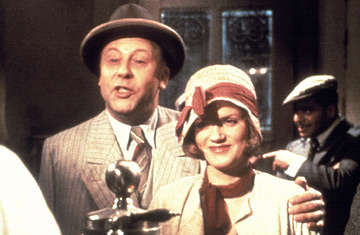
Gunther Lamprecht and Barbara Sukowa in Berlin Alexanderplatz, 1980
1980; Writer-director: Rainer Werner Fassbinder, from the novel by Alfred Döblin
With Gunter Lamprecht, Gottfried John, Barbara Sukova, Hanna Schygulla, Elizabeth Trissenaar
The Criterion Collection
Available Nov. 13, List Price $124.95
Germany, 1927. Franz Biberkopf (Lamprecht) presses his hands to the sides of his head, as if he were about to pulverize a rancid cantaloupe, and screams. A laborer and part-time pimp who has just been released from prison after serving four years for beating a girlfriend to death, Franz is dull and heavy, a Zolaesque human beast, but less a villain than a big lug. His attention span is so short he cannot even hold a grudge. He feels no remorse for the wrong he has done, no vengeance toward those who have wronged him. His life is determined by forces — of personality, of society, of fate — he has neither the will nor the power to control. He is the simple, dogged, malleable soul of Germany between the wars, when there was little sunlight and a person had every right to scream.
Döblin's 600-page epic — part newsreel, part nightmare, a documentary melodrama written in blood and neon — was first filmed in 1931, by director Phil Jutzi, with the author writing the script. (This version, a fascinating precis of the story, is included in the seven-disc Criterion box set.) Decades later the young Fassbinder read the book and became obsessed by it, so much so, he said, that he had "unconsciously made Döblin's fantasy my own life." Professionally and personally, Fassbinder could be no less brutal than Biberkopf, as countless stories about the humiliations he visited on his actor friends attest. But he was also a daring, indefatigable filmmaker, one of the defining artists of his generation, who churned out more than 40 films in a 15-year explosion of creative energy that ended with his death from a drug overdose at 36. Berlin Alexanderplatz, unspooling at 15-1/2 hrs. and over 14 weeks to an initially perplexed, often outraged German television audience, was his masterpiece.
As it cranes down Berlin boulevards or creeps toward two people in bed, Fassbinder's camera is a most fastidious voyeur, observing every ruction of sexual violence with a clinical sympathy. Döblin was trained as a doctor; Fassbinder was part surgeon, part coroner. Both men, and this film, say that we are all predatory animals, driven by the compulsions to fornicate and dominate. A bear of a man, Franz makes love with feral ferocity, strapping his mate around his body, biting her neck in carnivore passion. He may as well be biting himself. By the end, Franz and the one person he loves, the simple, gentle Mieze (Sukowa), will have become the secret agents of their own destruction.
No film that is the length of Wagner's Ring could be without its longueurs, and this one falls into a second-act slump that lasts about three hours. But the best and the most of Berlin is the best that Fassbinder ever did. He balances the weight of Döblin's carefully repetitious dialogue with the buoyancy of his elegiac visual style. He interrupts the naturalism of lives on the skids with scenes of shocking surrealism. An old goat-man slaughters a calf. Mieze's corpse turns to soft-focus glitter, as if she had become in death a Hollywood star. A scorpion clambers up the entwined legs of two lovers, across the woman's breast and into the bloody gape of her slit throat.
The film has been magnificently restored by its cinematographer Xaver Schwarzenberger. Actually, "restored" doesn't do justice to the improvement in visual integrity when the muddy 16mm original was digitally corrected. As Schwarzenberger says in the accompanying booklet, "Now you can see something." What you can see is a great work emerging from obscurity into clarity. The box set also features a 44 min. documentary, made during the shooting, that details the hugeness of the enterprise (a hundred speaking parts, 3,000 dress extras) and Fassbinder's brisk regimen. By shooting just one or two takes, he kept the actors as fresh as possible and averaged a remarkable 6 mins. of finished film per day.
This sprawling, pummeling, amazing work is not a lot of fun — I can't imagine the fanboys will be organizing Berlin Alexanderplatz marathons — but in its remorseless depiction of these doomed creatures it opens doors into the dark chambers of common experiences and fears. And on the wall of that room is a mirror. As Fassbinder wrote about the novel, "Again and again, I was forced, as any reader is, to return to my own reality, to analyze everybody's reality. A criterion, by the way, by which I would measure any work of art."
By any standard, the issuing of Berlin Alexanderplatz is one of the year's major artistic events.